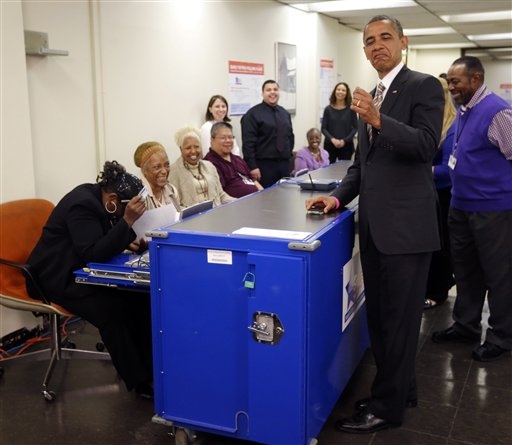
WASHINGTON (AP) — The 2012 tight U.S. presidential race has passed the $2 billion mark in fundraising, fueled by an outpouring of cash from both ordinary citizens and the wealthiest Americans hoping to influence an election now less than two weeks away.
The election is on track to be the costliest in modern U.S. history. It comes amid a campaign finance system vastly altered by the new proliferation of outside groups and independent "super" political committees that are bankrolling a barrage of TV ads in the nine battleground states that will decide the election.
President Barack Obama and Republican challenger Mitt Romney have brought in about $1.7 billion so far this election, according to fundraising reports submitted Thursday night.
Then there is the nearly $300 million in donations involving super PACs since early 2011, as well as tens of millions more in donations to nonprofit groups that run election-related ads but don't have to disclose their donors.
Obama, the Democratic Party and related fundraising committees raised a combined $88.8 million for the first 15 days of October, reports showed, while Romney's fundraising apparatus brought in $111.8 million during the same period.
Two pro-Romney groups led the way. American Crossroads, a Republican-leaning super PAC with ties to former President George W. Bush's longtime political counselor Karl Rove, reported raising at least $79.6 million through Oct. 15. Restore Our Future, founded by former Romney aides, reported pulling in $130.6 million so far. Priorities USA, a pro-Obama group founded by two former aides to the president, reported $62.8 million in contributions.
The emergence of super PACs and other outside groups, emboldened in part by a Supreme Court decision in 2010, has done more than anything else to reshape fundraising. A handful of federal court cases have broadly eased campaign finance regulations, allowing donors to give unlimited sums. That kind of money has largely been funneled to super PACs, which can raise and spend money on behalf of candidates as long as they don't coordinate expenditures or strategy with the campaign.
"The distinctive factor in this election is the outside money being spent and the corrupting money financing it," said Fred Wertheimer, a longtime campaign finance reform advocate.
This year marked the first time that both major party candidates opted out from the public financing system established to set limits on how much a presidential candidate can raise and spend. Both Obama and Romney would have been eligible for about $100 million in taxpayer money to support their campaigns through the general election, but both gambled — correctly — that they could raise and spend far more.
In 2008, Obama became the first presidential contender to refuse all public financing while his Republican rival, Sen. John McCain, accepted the government funds. The lopsided result — Obama outspent McCain by more than 2-to-1 in the general election — effectively ended public funding as an option for serious candidates.
With the 2012 election so tight, both Obama and Romney have spent considerable time at high-dollar fundraising events courting wealthy donors. Romney last month lamented the time spent fundraising rather than speaking to larger groups of voters, saying that "fundraising is a part of politics when your opponent decides not to live by the federal spending limits."
Federal election regulators have raised the limit on individual contributions to candidates, which means campaigns can solicit more money from donors than they have in the past. Individual donors can now give a total of $5,000 in the primary and general elections to a candidate, compared to just $2,000 in 2000.
Michael Toner, a Republican campaign finance lawyer and former chairman of the Federal Election Commission, said the close race and the sharply polarized electorate have also played a role in accelerating the dash for dollars.
"I don't know any campaign manager who thinks they have too much money. In this political 50-50 environment you can't ever have enough," Toner said. "Every last million could make the difference in who is elected."
Las Vegas casino mogul Sheldon Adelson is the top super PAC donor this year. Adelson, a billionaire, has contributed more than $40 million to Republican super PACs, including those backing Romney and former candidate and House Speaker Newt Gingrich.